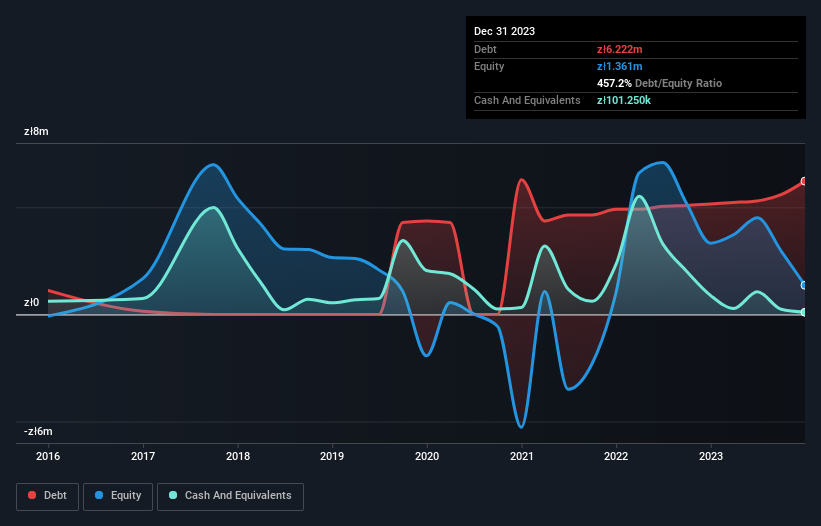
Legendary fund manager Li Lu (who Charlie Munger backed) once said, 'The biggest investment risk is not the volatility of prices, but whether you will suffer a permanent loss of capital.' It's only natural to consider a company's balance sheet when you examine how risky it is, since debt is often involved when a business collapses. We can see that Nestmedic S.A. (WSE:NST) does use debt in its business. But should shareholders be worried about its use of debt?
Why Does Debt Bring Risk?
Debt and other liabilities become risky for a business when it cannot easily fulfill those obligations, either with free cash flow or by raising capital at an attractive price. Ultimately, if the company can't fulfill its legal obligations to repay debt, shareholders could walk away with nothing. However, a more common (but still painful) scenario is that it has to raise new equity capital at a low price, thus permanently diluting shareholders. Of course, the upside of debt is that it often represents cheap capital, especially when it replaces dilution in a company with the ability to reinvest at high rates of return. When we examine debt levels, we first consider both cash and debt levels, together.
See our latest analysis for Nestmedic
What Is Nestmedic's Net Debt?
The image below, which you can click on for greater detail, shows that at December 2023 Nestmedic had debt of zł6.22m, up from zł5.16m in one year. Net debt is about the same, since the it doesn't have much cash.

How Healthy Is Nestmedic's Balance Sheet?
We can see from the most recent balance sheet that Nestmedic had liabilities of zł5.39m falling due within a year, and liabilities of zł6.09m due beyond that. Offsetting this, it had zł101.3k in cash and zł8.12m in receivables that were due within 12 months. So its liabilities outweigh the sum of its cash and (near-term) receivables by zł3.25m.
Of course, Nestmedic has a market capitalization of zł26.0m, so these liabilities are probably manageable. Having said that, it's clear that we should continue to monitor its balance sheet, lest it change for the worse. When analysing debt levels, the balance sheet is the obvious place to start. But you can't view debt in total isolation; since Nestmedic will need earnings to service that debt. So when considering debt, it's definitely worth looking at the earnings trend. Click here for an interactive snapshot.
In the last year Nestmedic had a loss before interest and tax, and actually shrunk its revenue by 8.5%, to zł1.7m. That's not what we would hope to see.
Caveat Emptor
Importantly, Nestmedic had an earnings before interest and tax (EBIT) loss over the last year. Its EBIT loss was a whopping zł6.1m. Considering that alongside the liabilities mentioned above does not give us much confidence that company should be using so much debt. Quite frankly we think the balance sheet is far from match-fit, although it could be improved with time. However, it doesn't help that it burned through zł6.7m of cash over the last year. So in short it's a really risky stock. The balance sheet is clearly the area to focus on when you are analysing debt. However, not all investment risk resides within the balance sheet - far from it. Be aware that Nestmedic is showing 5 warning signs in our investment analysis , and 4 of those are significant...
At the end of the day, it's often better to focus on companies that are free from net debt. You can access our special list of such companies (all with a track record of profit growth). It's free.
Valuation is complex, but we're here to simplify it.
Discover if Nestmedic might be undervalued or overvalued with our detailed analysis, featuring fair value estimates, potential risks, dividends, insider trades, and its financial condition.
Access Free AnalysisHave feedback on this article? Concerned about the content? Get in touch with us directly. Alternatively, email editorial-team (at) simplywallst.com.
This article by Simply Wall St is general in nature. We provide commentary based on historical data and analyst forecasts only using an unbiased methodology and our articles are not intended to be financial advice. It does not constitute a recommendation to buy or sell any stock, and does not take account of your objectives, or your financial situation. We aim to bring you long-term focused analysis driven by fundamental data. Note that our analysis may not factor in the latest price-sensitive company announcements or qualitative material. Simply Wall St has no position in any stocks mentioned.
About WSE:NST
Nestmedic
Engages in the manufacture, distribution, and sale of mobile telemedical solution under the Pregnabit brand.
Slight with imperfect balance sheet.
Market Insights
Community Narratives



